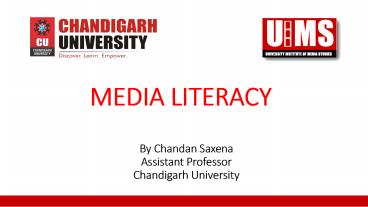MEDIA LITERACY - PowerPoint PPT Presentation
Title:
MEDIA LITERACY
Description:
To understand Media Literacy To be aware about World Major Channels. To know about the Emerging Technology and Media Privacy – PowerPoint PPT presentation
Number of Views:523
Title: MEDIA LITERACY
1
MEDIA LITERACY By Chandan SaxenaAssistant
ProfessorChandigarh University
2
Course Objective
- To understand Media Literacy
- To be aware about World Major Channels.
- To know about the Emerging Technology and Media
Privacy
www.cuchd.in Campus Gharuan, Mohali
www.cuchd.in Campus Gharuan, Mohali
3
Topic Objective
- To understand Media Literacy
- To be aware about Theoretical concept of Media
Literacy. - To know the concept of Media Literacy.
www.cuchd.in Campus Gharuan, Mohali
www.cuchd.in Campus Gharuan, Mohali
4
What is MEDIA LITERACY?
- Media literacy encompasses the practices that
allow people to access, critically evaluate, and
create media. Media literacy is not restricted to
one medium.
5
Whats is Media Literarcy?
- Media Literacy is the ability to access, analyze,
evaluate and create media in a variety of forms. - Media Literacy is a 21st century approach to
education. It provides a framework to access,
analyze, evaluate, create and participate with
messages in a variety of forms from print to
video to the Internet. Media literacy builds an
understanding of the role of media in society as
well as essential skills of inquiry and
self-expression necessary for citizens of a
democracy.
www.cuchd.in Campus Gharuan, Mohali
6
What is Media Literacy?
The word "literacy" usually describes the ability
to read and write. Reading literacy and media
literacy have a lot in common. Reading starts
with recognizing letters. Pretty soon, readers
can identify words -- and, most importantly,
understand what those words mean. Readers then
become writers. With more experience, readers and
writers develop strong literacy skills.
www.cuchd.in Campus Gharuan, Mohali
www.cuchd.in Campus Gharuan, Mohali
7
Essential Skills for Media Literacy
- Media literacy is an essential skill in the
digital age, Specifically, it helps Youth - Learn to think critically.
- Become a smart consumer of products and
information. - Recognize point of view.
- Create media responsibly.
- Identify the role of media in our culture.
- Understand the author's goal
www.cuchd.in Campus Gharuan, Mohali
www.cuchd.in Campus Gharuan, Mohali
8
Thoretical Conepts of Media Literacy
Theoretical concepts for media literacy
education A variety of scholars have proposed
theoretical frameworks for media literacy. Renee
Hobbs identifies three frames for introducing
media literacy to learners authors and audiences
(AA), messages and meanings (MM), and
representation and reality (RR). In synthesizing
the literature from media literacy, information
literacy, visual literacy and new literacies, she
identifies these core ideas that form the
theoretical context for media literacy.
www.cuchd.in Campus Gharuan, Mohali
www.cuchd.in Campus Gharuan, Mohali
9
Theoretical aspect according to David Buckingham
David Buckingham has come up with four key
concepts that "provide a theoretical framework
which can be applied to the whole range of
contemporary media and to 'older' media as well
Production, Language, Representation, and
Audience." These concepts are defined as
follows
www.cuchd.in Campus Gharuan, Mohali
www.cuchd.in Campus Gharuan, Mohali
10
Theoretical aspect according to David Buckingham
- Production
- Media texts are consciously made. Some are made
by individuals working alone, just for themselves
or their family and friends, but most are
produced and distributed by groups of people
often for commercial profit. Economic interests
and the generation of profit are often at stake
in media production. - Campus Gharuan, Mohali
www.cuchd.in Campus Gharuan, Mohali
11
Theoretical aspect according to David Buckingham
- Representation
- The notion of 'representation' is one of the
first established principles of media education.
Media offers viewers a facilitated outlook of the
world and a re-representation of reality. Media
production involves selecting and combining
incidents, making events into stories, and
creating characters. Media representations allow
viewers to see the world in some particular ways
and not others. Audiences also compare media with
their own experiences and make judgments about
how realistic they are. Media representations can
be seen as real in some ways but not in others
viewers may understand that what they are seeing
is only imaginary and yet they still know it can
explain reality. - d.in Campus Gharuan, Mohali
www.cuchd.in Campus Gharuan, Mohali
12
Theoretical aspect according to David Buckingham
- Audience
- Studying audiences means looking at how
demographic audiences are targeted and measured,
and how media are circulated and distributed
throughout. It looks at different ways in which
individuals use, interpret, and respond to media.
The media increasingly have had to compete for
people's attention and interest because research
has shown that audiences are now much more
sophisticated and diverse than has been suggested
in the past decades. Debating views about
audiences and attempting to understand and
reflect on our own and others' use of media is
therefore a crucial element of media education.
www.cuchd.in Campus Gharuan, Mohali
www.cuchd.in Campus Gharuan, Mohali
13
Theoretical aspect according to David Buckingham
- Language
- Understand the language what the message indicate
about any product. - chd.in Campus Gharuan, Mohali
www.cuchd.in Campus Gharuan, Mohali
14
Topic Outcome
- Students gained basic understanding of Media
Literacy. - Students understood Theoretical aspect of
literacy . - Students Know the concept of Media Literacy.
Campus Gharuan, Mohali
www.cuchd.in
15
FAQS
- Media Literacy and its theoretical concept?
- Theoretical concept of David Buckingham?
- Skills of Media Literacy?
Campus Gharuan, Mohali
www.cuchd.in
16
THANKS
www.cuchd.in Campus Gharuan, Mohali

